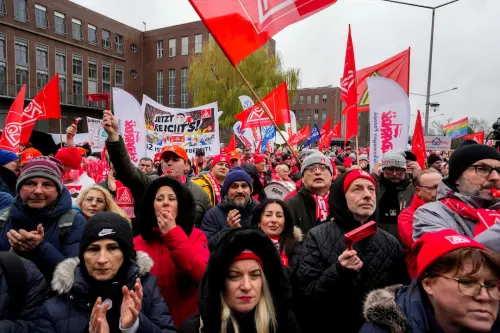Germany is poised to face significant labor disputes in 2025 as the traditional bond between companies and workers, crucial for the country's economic prosperity, is unraveling amidst fierce competition, economic challenges, and rising costs.
Labor leaders at major industrial firms including Bosch, Thyssenkrupp ZF Friedrichshafen, and Volkswagen, collectively representing over half a million German employees, report a heightened determination by companies to reduce jobs, close facilities, and relocate workers overseas.
This shift in attitude is attributed to the ailing state of Europe's leading economy, which has heavily relied on labor-intensive industries like automotive and chemicals. Germany, once an economic powerhouse, is now grappling with formidable challenges globally.
The efficacy of Germany's principle of "co-determination," ensuring significant worker representation on company supervisory boards, is being called into question as a potential impediment to swift corporate reorganization, a topic likely to feature prominently in the upcoming elections on February 23.
Anticipating a turbulent year ahead, Knut Giesler, deputy chair of Thyssenkrupp's steel unit and head of the influential IG Metall union in North Rhine-Westphalia, warns of ongoing disputes, notably at Thyssenkrupp involving plans to cut jobs or outsource roles.
As companies like ZF Friedrichshafen and Bosch grapple with the pressures of restructuring, including significant job reductions, tensions are escalating. Labor unions, such as IG Metall and Verdi, are seeing diminished memberships amid increasing challenges in safeguarding worker rights amidst corporate demands for radical transformations.
As the economic transformation unfolds, companies like Bosch, ZF Friedrichshafen, Thyssenkrupp, and Volkswagen are navigating the need for profound structural reforms in response to overcapacity and mounting global competition.
Facing a 28% decline in car production since 2016, Germany is grappling with the imperative to adapt to a changing economic landscape. Labor disputes have intensified, leading to a surge in strikes, posing significant economic costs and challenges for firms seeking to implement necessary changes.
Amidst a forecast of sluggish economic growth in 2025, companies and unions are compelled to adjust by restructuring through workforce reductions. The prevailing uncertainty underscores the need for collaborative efforts between employers and employees to navigate the evolving economic climate effectively.
